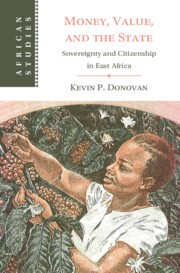Book contents
- Money, Value, and the State
- African Studies Series
- Money, Value, and the State
- Copyright page
- Dedication
- Contents
- Figures
- Acknowledgments
- A Note on the Text
- Introduction
- 1 The Moneychanger State
- 2 A Monopoly on Valuation
- 3 Restricted Value
- 4 Crimes against Economy
- 5 Magendo
- Conclusion
- Archival Collections Consulted
- Bibliography
- Index
- African Studies Series
Introduction
The Government of Value, 1945–1980
Published online by Cambridge University Press: 05 December 2024
- Money, Value, and the State
- African Studies Series
- Money, Value, and the State
- Copyright page
- Dedication
- Contents
- Figures
- Acknowledgments
- A Note on the Text
- Introduction
- 1 The Moneychanger State
- 2 A Monopoly on Valuation
- 3 Restricted Value
- 4 Crimes against Economy
- 5 Magendo
- Conclusion
- Archival Collections Consulted
- Bibliography
- Index
- African Studies Series
Summary
For many postcolonies, a national currency—like a constitution, flag, or passport—was a necessary accompaniment to independence. Money and credit were more than potent symbols of decolonization; they were means of constituting a new political order. This Introduction argues that the monetary regimes established in Kenya, Uganda, and Tanzania aimed to remake their independent societies, turning savings, loans, and other financial instruments into the infrastructure of citizenship and statecraft. These instruments tried to create a “government of value” in which personal interest and collective advance were aligned through mechanisms that were simultaneously ethical and economic, cultural and political. They did so because colonial subjects experienced empire as not only political domination but also a constraint on economic liberties. Yet, the ensuing decolonization was at best partial, not least because the value of national currencies depended on the accumulation of foreign money. Moreover, the independent political economy of East Africa created new inequalities and divisions. Struggles over money, credit, and commodities would animate a series of struggles between bankers and bureaucrats, farmers and smugglers in the coming decades. By detailing the notion of the “moneychanger state,” this chapter provides the conceptual frameworks to understand these conflicts in new ways.
Keywords
- Type
- Chapter
- Information
- Money, Value, and the StateSovereignty and Citizenship in East Africa, pp. 1 - 50Publisher: Cambridge University PressPrint publication year: 2024

